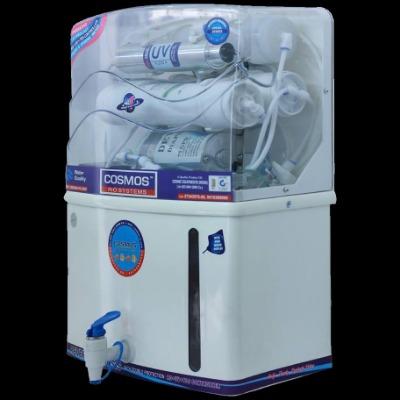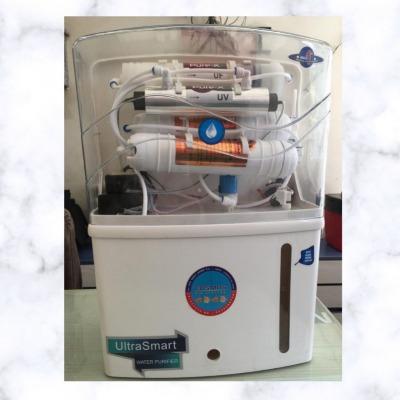Alkaline VS UV Water Purifiers
When it comes to ensuring the purity of our drinking water, choosing the right water purifier is crucial. With an array of options available in the market, it can be challenging to decide which one is best suited for your needs. Two popular choices are alkaline water purifiers and UV water purifiers. In this article, we will explore the features, benefits, limitations, and key differences between these two types of water purifiers to help you make an informed decision.
What is an Alkaline Water Purifier?
An alkaline water purifier is designed to raise the pH level of water, making it less acidic and more alkaline. These purifiers typically use a process known as ionization to separate the water into alkaline and acidic components. The alkaline water is considered to have various health benefits due to its higher pH level and the presence of minerals.

How does Alkaline Water Purifier Work?
Alkaline water purifiers use a filtration system that often consists of activated carbon filters, sediment filters, and an ion exchange membrane. These filters remove impurities and contaminants from the water while allowing essential minerals to pass through. Subsequently, the water is exposed to an electrolysis chamber that separates it into alkaline and acidic components.
Benefits of Alkaline Water Purifiers
- Alkaline water is believed to have antioxidant properties that can help neutralize harmful free radicals in the body.
- It may aid in maintaining the body’s pH balance and reducing acidity levels.
- Some studies suggest that alkaline water can improve hydration and digestion.
- The presence of minerals in alkaline water can contribute to overall mineral intake.
Potential Drawbacks of Alkaline Water Purifiers
- Alkaline water purifiers can be relatively expensive compared to other types of water purifiers.
- The increased pH level of water may not be suitable for everyone, especially those with certain medical conditions or on specific medications.
- It’s important to ensure the quality and safety of the source water before relying solely on alkaline water purifiers.
What is a UV Water Purifier
A UV water purifier uses ultraviolet light to disinfect water by deactivating harmful microorganisms such as bacteria, viruses, and parasites. This technology is highly effective in destroying the DNA of these pathogens, rendering them unable to reproduce and cause harm.

How does UV Water Purifier Work?
UV water purifiers consist of a UV lamp that emits UV-C light. When water passes through the purifier, the UV light penetrates the microorganisms’ cells, disrupting their DNA structure. As a result, the microorganisms are unable to replicate, rendering them harmless.
Advantages of UV Water Purfiers
- UV water purifiers are highly effective in killing a wide range of microorganisms, including bacteria, viruses, and parasites.
- Unlike chemical disinfectants, UV purification leaves no residue or taste in the water.
- It does not alter the water’s pH level or remove essential minerals, ensuring the water’s natural taste and quality.
Limitations of UV Water Purifiers
- UV purification alone does not remove dissolved impurities, chemicals, or heavy metals from the water.
- The effectiveness of UV purifiers can be influenced by the water’s turbidity, so pre-filtration may be required if the water is visibly cloudy.
- UV lamps require periodic replacement to maintain optimal performance.
Alkaline VS UV Water Purifiers: Key Differences
- Alkaline water purifiers focus on improving the pH level and mineral content of water, while UV purifiers primarily target microorganisms.
- Alkaline water purifiers use filtration and ionization processes, while UV purifiers rely on UV-C light for disinfection.
- Alkaline water purifiers are more suitable for individuals looking for enhanced hydration and potential health benefits, while UV purifiers are ideal for those primarily concerned with eliminating harmful microorganisms.
Factors to consider when choosing between the two
- Water quality: Assess the specific contaminants present in your water source and choose a purifier that effectively removes those impurities.
- Health considerations: Consider any specific health conditions or sensitivities you or your family members may have. Consult a healthcare professional if necessary.
- Budget: Determine the initial cost, maintenance requirements, and operating expenses associated with both types of purifiers.
- Ease of installation and maintenance: Evaluate the installation process and ongoing maintenance requirements of the purifiers.
- Personal preferences: Consider the taste, odor, and other subjective factors that may influence your choice.
Which Water Purifier Is Right For You?
Choosing the right water purifier ultimately depends on your specific needs and priorities. If you are primarily concerned with eliminating harmful microorganisms and maintaining the water’s natural taste, a UV water purifier may be the best option. On the other hand, if you are looking for potential health benefits associated with alkaline water and improved hydration, an alkaline water purifier might suit you better.
Maintenance & Cost Comparision
In terms of maintenance, both types of purifiers require periodic servicing and part replacement. However, alkaline water purifiers might have additional costs associated with replacing ion exchange membranes or filters. UV water purifiers typically require UV lamp replacement every 6-12 months.
The initial cost of alkaline water purifiers can be higher due to their filtration and ionization processes. UV water purifiers, while slightly more affordable, may require pre-filtration if the source water is turbid. Consider the long-term costs and benefits before making your decision
Conclusion
When it comes to choosing between alkaline water purifiers and UV water purifiers, it’s important to understand their features, benefits, limitations, and your specific requirements. Assess the water quality, consider health considerations, evaluate the budget, and factor in personal preferences. Ultimately, the right water purifier is the one that meets your needs for clean, safe, and refreshing drinking water.
